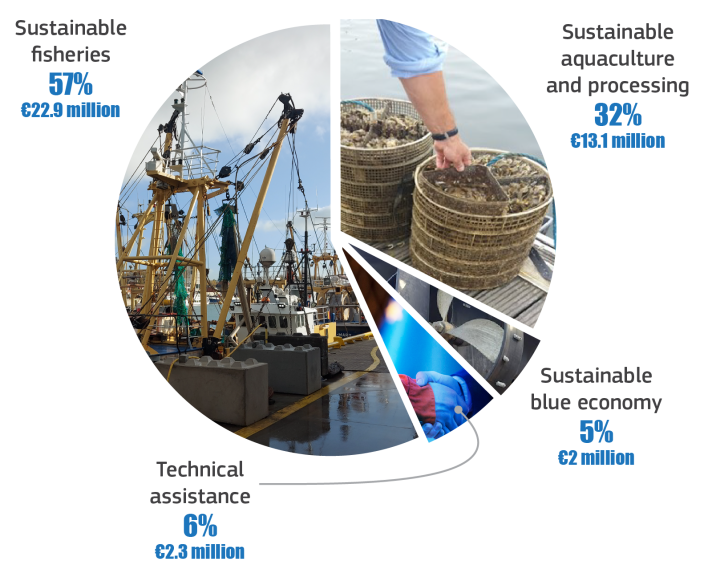
Following the adoption of the Partnership Agreement 2021-2027 with Belgium, the Commission has adopted the European Maritime, Fisheries and Aquaculture Fund (EMFAF) programme for Belgium, to implement the EU common fisheries policy (CFP) and EU policy priorities outlined in the European Green Deal. The total financial allocation for the Belgian programme is €68.3 million for the 2021-2027 period, of which the EU contribution accounts for €40.3 million.
Commissioner for Environment, Oceans and Fisheries, Virginijus Sinkevičius, said:
I am delighted to announce this new EMFAF Programme that will support a wide range of innovative projects in Belgium, accelerating the green and digital transition of the fisheries and aquaculture sectors. Belgium’s fisheries sector will be encouraged to become more energy efficient and reduce its CO2 emission, and will benefit from support for better health, safety and working conditions on board and highly skilled staff. The programme will help the aquaculture sector adapt to climate change and further professionalise, further improve the knowledge of marine life and modernise the local primary sector. I am confident that the programme will safeguard the marine environment and conditions for maintaining fish stocks in good conditions, while supporting the industry’s profitability.
Supported activities
57% of the programme’s allocation will be dedicated to sustainable fisheries (including 31% for control and data collection), 32% will be invested in sustainable aquaculture and in processing and marketing, and 5% will be dedicated to sustainable blue economy in the coastal region, all contributing to the EU’s environmental and climate objectives.
The programme will support, among other things:
- Sustainable fisheries: investments to comply with the landing obligation and avoid discards at sea; conservation policies; fisheries control and data collection; investments in fishing vessels to improve safety, health, hygiene, working conditions; energy efficiency and decarbonisation in fisheries.
- Sustainable aquaculture: investments in sustainable aquaculture projects and for the diversification of farmed aquaculture species; energy efficiency and decarbonisation in aquaculture and the processing of the fish products.
- Sustainable blue economy: development of the coastal area through a Local Action Group (LAG).
Main expected outcomes until 2027
The Belgian EMFAF programme will contribute to the EU policy priorities outlined in the European Green Deal, Farm to Fork and Biodiversity strategies.
The programme will support the resilience of the fisheries and aquaculture sectors, including through improving energy efficiency of vessels, infrastructure and staff skills, if needed also by using compensation schemes to support the relevant blue economy sectors from future crises.
It will support the green transition of the sector with investments aimed at improving gear selectivity, decarbonisation and energy efficiency and engine replacement.
The digital transition of the Belgian fisheries, aquaculture and processing sectors is a key area of the programme: it includes a wide range of innovative solutions from means of control and collection of fisheries data to new IT technologies applied to aquaculture production and traceability of products along the whole value chain.
Under the EMFAF programme, the operations needed to protect and restore Marine Protected Areas will be supported. Also, collection of marine litter and restoring wild fish migration routes and thus improving the habitat of wild species is part of the programme.
The programme will reinforce the environmental actions undertaken under the Belgian Prioritised Action Framework for Natura 2000: monitoring of marine and maritime habitats and species and promotion of scientific knowledge, in line with the EU’s Birds and Habitats Directives.
The EMFAF programme benefits from a good collaboration between the European Commission, national managing authorities and local partners. It will support community-led local development strategies (CLLDs), a bottom-up approach that encourages local people to form a Local Action Group (LAG) and develop blue economy initiatives and entrepreneurship.
Background
The EMFAF runs from 2021 to 2027 and supports the EU common fisheries policy (CFP), the EU maritime policy and the EU agenda for international ocean governance. The fund helps achieve sustainable fisheries and conserve marine biological resources.
Article 8 of the EMFAF Regulation (EU) 2021/1139 requires Member States to produce a national implementation programme for the EMFAF. This programme focuses on EU priorities, laying down the strategy and investment priorities, including the indicative annual financial allocation for each priority. The programme is subject to approval by the European Commission.
More information
Regulation (EU) 2021/1060 of the European Parliament and of the Council of 24 June 2021 laying down common provisions on the European Regional Development Fund, the European Social Fund Plus, the Cohesion Fund, the Just Transition Fund and the European Maritime, Fisheries and Aquaculture Fund and financial rules for those and for the Asylum, Migration and Integration Fund, the Internal Security Fund and the Instrument for Financial Support for Border Management and Visa Policy
Details
- Publication date
- 19 December 2022
- Author
- Directorate-General for Maritime Affairs and Fisheries

